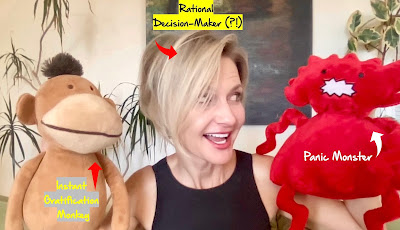 |
I hate to brag, but…
I’m a master procrastinator. 🏆
Yeah, valedictorian-level. 🎓
I know I might make it look effortless, but I have an advantage.
Thanks to Tim Urban’s 2016 TED Talk on procrastination, I’ve learned that I have an Instant Gratification Monkey in my mind.
Don’t be fooled by his cuteness. He grabs the attention of the Rational Decision-Maker (me?) every time I try to do something productive.
That little monkey takes me down the rabbit hole of perusing online retailers (I’m looking at you, Revolve), searching Instagram for updates on Noodle the Pug (It’s a No Bones Day! I must sleep in!), and reorganizing the books on my shelves by color… because those things are instantly more gratifying than whatever important task is at hand.
MORE. DOPAMINE. PLEASE! 🙏😳
Luckily, Tim taught me that I also have a guardian angel of sorts, a red Panic Monster, who wakes up and freaks out anytime deadlines are closer than they appear in that little side mirror of my mind. He scares the Instant Gratification Monkey away and forces the Rational Decision Maker-me to get sh!t done.
And the thing is, I always do; I always get things done. Admittedly, it’s often at the expense of lost sleep and a bunch of extra pressure on myself and those who live in my house, but I deliver the goods. And they’re good. 😎
Now here’s the part of the post where I tell you how I’ve overcome my procrastination, and I now plan everything out months ahead of due dates.
*sigh*
But that hasn’t happened.
You can’t unring a bell, and you can’t dumb down an expert.
If you’re like me, you might be trying to keep that little Instant Gratification Monkey well-fed but in line. It’s a constant effort. I have grown to accept that I actually work best and get more creative when a deadline is close, though. Now instead of kicking myself for putting things off, I trust that I’ll get things done when the need nears. I always do.
I encourage you to put off whatever you’re supposed to be doing right now and watch Tim’s TED Talk. You and your IG monkey will be glad you did.
https://www.ted.com/talks/tim_urban_inside_the_mind_of_a_master_procrastinator
